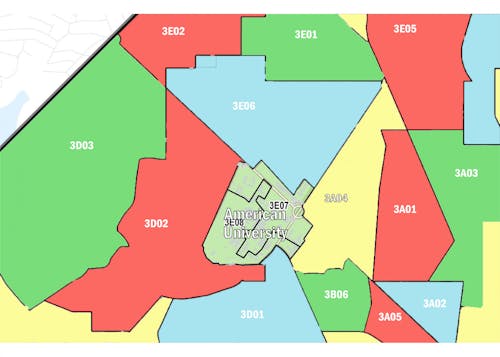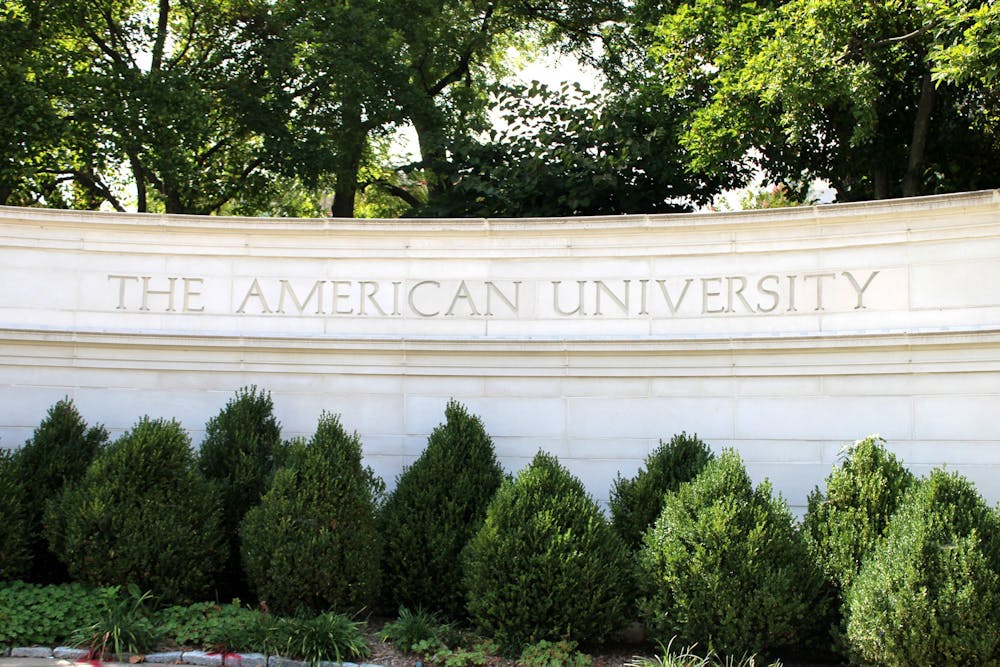In the lengthy debate over redistricting earlier this year, one of the changes made to Ward 3’s Advisory Neighborhood Commission map was the addition of a second seat representing American University students.
AU’s outgoing ANC commissioner, Christian Damiana, fought for the second seat and called it a major win for AU students, saying it would give them a stronger voice in local government.
Now, the election to fill both seats is just five weeks away. The number of candidates on the ballot? Zero.
“A lot of students don’t know that’s an opportunity available to them, or that it even exists,” said Damiana, who represented AU during his junior and senior years and is now a graduate student at AU.
However, only students living on campus are eligible to run for the seats. AU’s on-campus housing is split in half between two single-member districts, ANC 3E07 and 3E08. Because candidates are required by law to be registered to vote in D.C., very few campus residents qualify for the ballot.
Similarly, only legal D.C. residents can vote for ANC members. As a result, few students are eligible to vote for seats composed only of campus housing, since most students keep their home address.
There is one write-in candidate for 3E08, who could potentially be elected with just a handful of votes.
Rohin Ghosh, a College of Arts and Sciences sophomore from the San Francisco Bay Area says he’s running to bring local government more in tune with the needs of students.
“We’re here most of the year, so D.C. government decisions affect our day-to-day life,” he said. “I really encourage students to register to vote in D.C. and participate in the D.C. government.”
The other seat will remain vacant and will not be filled by an appointment if nobody runs a write-in campaign, D.C. Board of Elections spokesperson Renée Brown said in an interview.
Another reason for the lack of candidates is that the nominating petition process, which allows candidates to get on the ballot, falls entirely during the summer when few people are on campus.
“It’s essentially impossible for students to do that,” Damiana said.
Running a write-in campaign eliminates the petition requirement, making it an appealing option for candidates throughout the district — not just students.
Write-in candidates don’t need to submit any paperwork to the city. They must only be a registered D.C. voter and have lived in their ANC district for at least 60 days prior to the election. This year that cutoff is Sept. 9, about two weeks after most AU students moved in for the school year.
Micah Rogers, a freshman in SPA, is running as a write-in candidate for 3E07. Ghosh said he hopes to draw attention to the work of ANCs by campaigning more actively in October. Still, he said, it’s difficult to build interest in an office that most constituents aren’t even eligible to vote for.
“The system really isn't set up for students to succeed,” he said.
What ANCs do
Advisory Neighborhood Commissions, as their name suggests, advise the D.C. government on matters related to their districts. The city’s eight wards each have multiple ANCs, which are designated with a letter name.
The Ward 3 ANC Redistricting Task Force this spring moved AU from ANC 3D, which includes Spring Valley and Wesley Heights, to 3E, centered in Tenleytown.

ANCs cannot pass any form of legislation. Instead, their input often comes in the form of written resolutions, which are sent to various city government agencies dealing with everything from bike lanes to liquor licenses.
“We’re usually very, very clear about how we feel and what we want. But we can’t force the district government to comply,” Damiana said.
This year, problems attracting candidates are not limited to AU. D.C. Board of Elections data shows 57 single-member districts are without a single candidate this election cycle. Many more districts have just one person on the ballot.
Damiana said less than half of commissioners elected in 2020 are seeking a second term. Commissioners serve two-year terms and are not paid.
“It’s very difficult to do the job, especially one that’s unpaid,” Damiana said. “But it’s absolutely possible to be a young person who’s serving as an elected official and to be effective.”
This article has been updated to include that Micah Rogers intends to run as a write-in candidate for 3E07.





